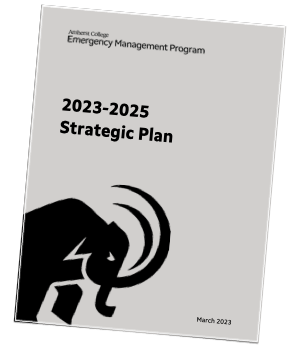
Vision Statement
A resilient College that deliberately manages emergency risk through distributed responsibility facilitated by the Office of Emergency Management.
Program Mission
The College's emergency management program sustains the pursuit of the Mission of Amherst College, fosters community and institutional resilience, provides for the management and coordination of prevention, mitigation, preparedness, response and recovery activities for all hazards, and encompasses all departments and individuals sharing responsibility for these activities.
Advisory Committee
The Emergency Management Advisory Committee (EMAC) is a broadly representative group of key stakeholders that provides for coordinated input to the emergency management program. Four regularly-scheduled meetings each year are dedicated to the EMAC’s role as the program’s advisory body – one each in fall, winter, spring, and summer. Operating by consensus, the EMAC:
- Provides input on policy development and direction on program priorities and activities.
- Approves the program’s Strategic Plan, Hazard Identification and Risk Assessment, Hazard Mitigation Plan, Training and Exercise Plan, and minor revisions of the Emergency Operations Plan.
- Endorses major revisions of the Emergency Operations Plan for higher-level approval.
- Receives after action reports (AARs) and annual updates.
Goals
The objectives identified in this strategy were developed to meet several goals. Building on its desire to be intentional in its risk reduction efforts, the College seeks to:
- Reduce anxiety and instill confidence in program stakeholders.
- Socialize a philosophy of shared responsibility for emergency management.
- Allow program priorities and activities to be driven by science and data.
- Use the Emergency Management Standard as a roadmap for program development.
Schedule of Significant Activities
Specific objectives aimed at achieving this plan’s goals are described in the attached schedule. This schedule is not exhaustive of all program activities. Several of the plans identified for development early in the planning period will establish a significant body of ongoing work for implementation concurrent to the activities identified in this plan. It will be important to consider capacity when developing these plans, while also being aspirational in our collective efforts.
Implementation and Shared Responsibility
The Office of Emergency Management is empowered with the authority to administer the program. The performance of program activities is facilitated by the Director of Emergency Management with the participation of program stakeholders. The Advisory Committee body is not a working group and does not actively participate in the performance of activities identified in this plan, though individual committee members and the departments they represent often play a significant role in the direct implementation of program activities.
A key principle of the emergency management program is shared responsibility across all departments and individuals at the College. It is critical that there be a sense of distributed program ownership, with the Office of Emergency Management in a supporting role to facilitate coordination and collaboration.
Legislative and Regulatory Changes
Through the performance of their day-to-day roles as well as membership in professional associations, a number of key College administrators keep apprised of proposed legislative and regulatory changes that may impact the emergency management program. Such proposals are brought before the Advisory Committee and may be addressed in a variety of ways, including preparation for their potential implementation and communication with elected officials and/or government agencies regarding the impact the changes may have on the College.
Emergency Management Standard
This strategic plan was developed to adhere to the Emergency Management Standard and several of its objectives are designed to further satisfy specific standard areas. A keystone goal of this plan is the College’s achievement of accreditation by the Emergency Management Accreditation Program.
Plan Maintenance
The Director of Emergency Management shall review this plan annually. As part of the review, progress toward the previous year's goals will be evaluated and summarized in a report for submission to the Advisory Committee. The Director of Emergency Management will present any proposed changes to this plan to the committee at a regularly-scheduled meeting for consideration and approval.
References
EMAP Technical Committee. “Emergency Management Standard.” Version 2022. Emergency Management Accreditation Program. February 2022 https://emap.org/index.php/what-is-emap/the-emergency-management-standard.